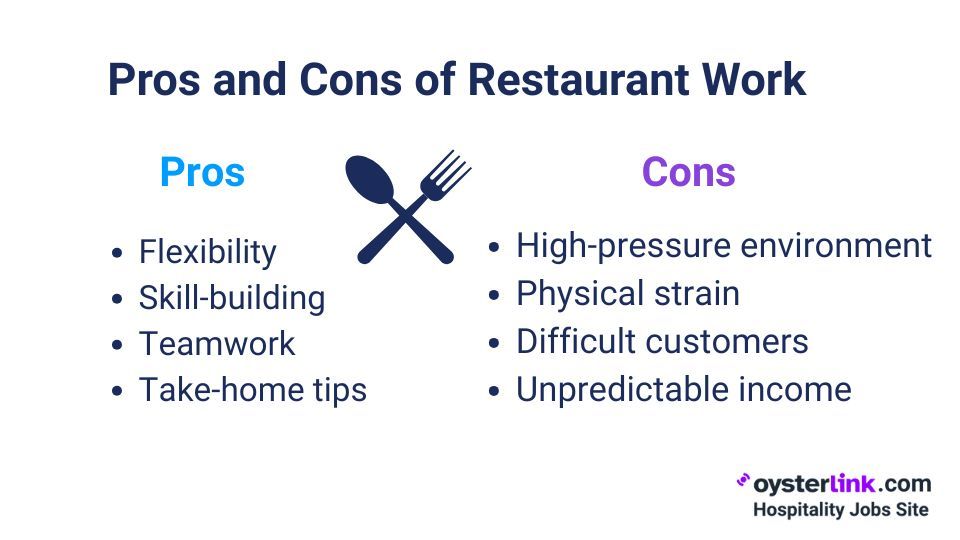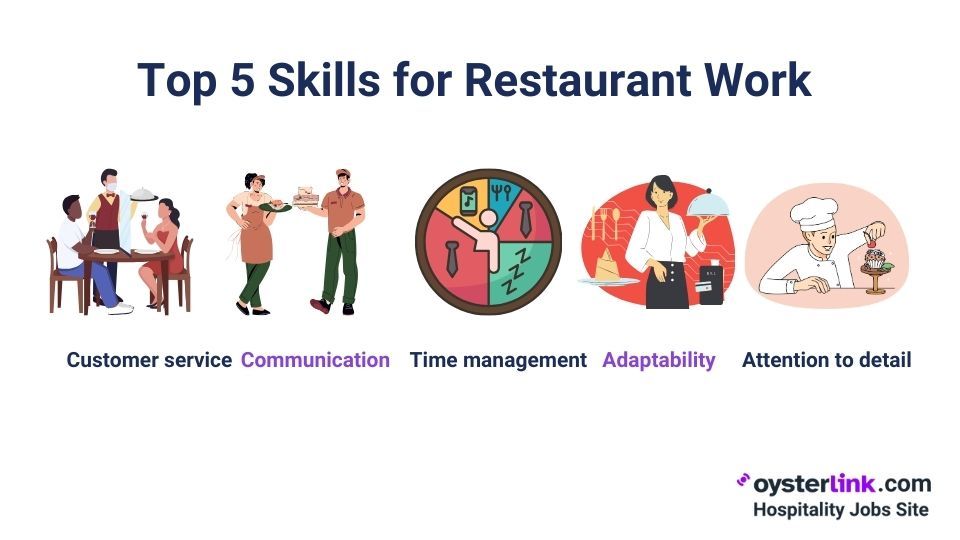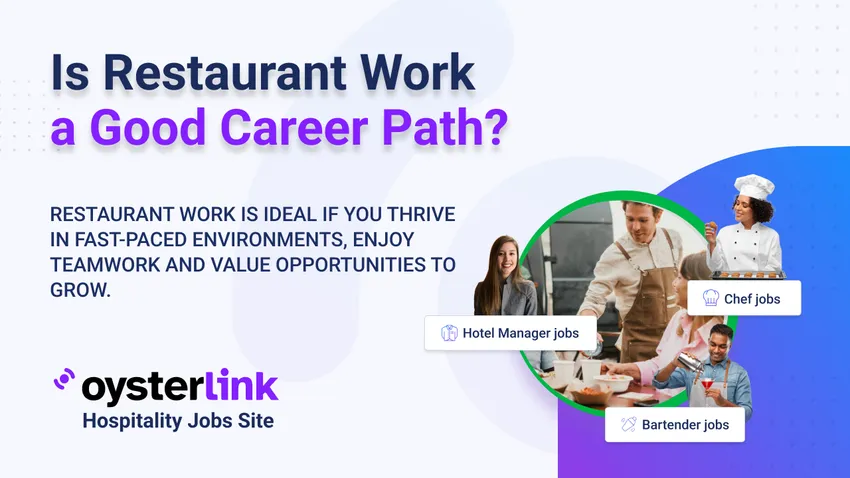Is Restaurant Work a Good Career Path? — Key Takeaways
- A career in restaurants offers many opportunities to grow, from entry-level roles to management and entrepreneurship.
- Successful restaurant careers require key skills like customer service, communication, adaptability, time management, and attention to detail.
- The industry is attractive for its variety, flexible schedules, team environment and potential for high earnings through tips and advancement.
- Despite their benefits, restaurant jobs can be physically demanding, stressful and unpredictable, so it’s important to weigh both pros and cons.
The restaurant industry has long been a cornerstone of the American workforce, and it shows no signs of slowing down.
In fact, the U.S. Bureau of Labor Statistics predicts that the number of jobs in food service will grow by 9% from 2021 to 2031, adding over 1.3 million new positions.
With such steady growth, it's clear that working in a restaurant can be more than just a temporary gig — it can be a rewarding long-term career path.
Whether you're just starting out or looking to climb the ladder, the opportunities in this field are as diverse as the meals served.
So, is working in a restaurant a good career path in 2025? Let's find out!
Is Working in a Restaurant a Good Career Path?
Yes, it can be — depending on what you’re looking for.
Restaurant work is ideal if you thrive in fast-paced environments, enjoy teamwork and value opportunities to grow.
There’s plenty of room to advance — Servers can work their way up to Restaurant Managers, and Barbacks can become Bartenders or even Sommeliers with enough dedication.
Full-time positions often come with perks like health insurance and paid time off (PTO), and the pay can be competitive.
Servers typically make around $35,457 annually (excluding tips), while Kitchen Managers earn an average of $56,460 per year.
That said, restaurant work isn’t for everyone. If you prefer a more predictable schedule, dislike physically demanding work or find the high-energy, customer-facing nature of the job overwhelming, it might not be the best choice for you.
15 Reasons Why You Should Say "Yes" to Restaurant Career
Working in restaurants is more than just a job — it’s an opportunity to grow, connect with people and experience the dynamic world of hospitality.
Whether you’re looking for a long-term career or a flexible job to fit your lifestyle, restaurant work has something to offer.
Here are 15 reasons why joining the restaurant industry could be a great choice:
1. Diverse career opportunities
Restaurants offer a wide range of roles to suit different skills and interests.
Whether you prefer customer-facing positions like Server or Host, behind-the-scenes roles like Line Cook or specialized paths like Sommelier, there’s a place for everyone.
The variety ensures that you can find a position that aligns with your strengths and passions.
2. Opportunities for growth
The restaurant industry is known for promoting from within. Many Restaurant Managers and even owners started as Servers or Bussers.
If you’re willing to put in the effort, you can quickly climb the ladder and take on leadership roles, learning valuable management skills along the way.
3. Flexible scheduling
Restaurants often offer non-traditional hours, which can be a huge advantage if you’re a student, parent or someone pursuing other interests.
Whether you prefer morning, evening or weekend shifts, there’s usually room to customize your schedule to fit your life.
4. Fast-paced environment
Every shift in a restaurant is an adventure. The constant buzz of activity keeps the workday exciting and helps time fly by. If you enjoy staying active and tackling challenges head-on, you’ll thrive in this high-energy environment.
5. Team-oriented work
Few industries rely on teamwork as much as restaurants. From coordinating food orders to ensuring customers have a seamless experience, you’ll collaborate closely with colleagues.
This camaraderie often leads to lasting friendships and builds strong communication and interpersonal skills.
6. Development of transferable skills
Working in restaurants equips you with valuable skills like problem-solving, multitasking and customer service.
These skills are highly sought after in many industries, making restaurant experience a great addition to your resume.
7. Financial potential
Tips can significantly boost your income, especially in customer-facing roles like Server or Bartender.
High-performing employees in busy establishments can earn far above the base salary, providing financial stability and even the opportunity to save.
8. Creative expression
For those passionate about food, drinks or hospitality, restaurants offer a creative outlet.
Whether you’re designing cocktails, plating dishes or curating an unforgettable dining experience, you’ll have opportunities to express yourself.
9. Cultural exposure
Restaurants bring together people from diverse backgrounds — both staff and guests.
This cultural exchange can broaden your horizons, expose you to new cuisines and foster a deeper understanding of different perspectives.
10. Immediate feedback and gratification
In restaurant work, you often see the results of your efforts in real-time.
it’s a satisfied customer, a smooth dinner service or a compliment from a Manager, this immediate feedback can be incredibly rewarding.
11. Opportunities to network
Working in restaurants connects you with a wide range of people, from coworkers to regular customers.
These relationships can lead to mentorships, future job opportunities or even lifelong friendships.
12. Perks and benefits
Many restaurants offer employee discounts on food and drinks, free meals during shifts and benefits like health insurance and paid time off for full-time employees.
These perks can make your day-to-day life more enjoyable while helping you save money.
13. Adaptability and resilience
The challenges of restaurant work — like handling high-pressure situations and difficult customers — help you build resilience and adaptability.
These traits will serve you well in any professional or personal endeavor.
14. Job security
With restaurants being a staple of every community, the demand for skilled hospitality workers remains steady. This means you’ll likely find opportunities wherever you go, which will provide a sense of stability in a constantly shifting job market.
15. A gateway to entrepreneurship
Many restaurant professionals go on to open their own establishments. By gaining hands-on experience in the industry, you’ll develop the skills and knowledge needed to run your own business someday.
Now that we’ve explored the many benefits of working in restaurants, it’s important to consider some of the challenges that come with the job.

Challenges of Working in Restaurants
While there are many reasons to consider a career in restaurants, it’s important to be aware of the challenges you may face.
Like any job, restaurant work comes with its own set of obstacles that can make the experience demanding at times.
From long hours to physically taxing tasks, here are some of the key challenges you should consider before committing to a restaurant career:
- Long and irregular hours: Many restaurant positions require working nights, weekends, and holidays, which can make it difficult to maintain a balanced schedule.
- Physical demands: Restaurant work often involves long hours on your feet, lifting heavy items and staying active throughout your shift, which can be physically exhausting.
- High stress and pressure: The fast-paced environment can lead to stress, particularly when managing busy shifts or dealing with multiple tasks at once.
- Difficult customers: Interacting with rude or challenging customers is a regular part of the job, requiring patience and composure.
- Low starting pay: Many entry-level restaurant roles offer minimum wage or slightly above, with tips helping to boost income but not guaranteed.
- Limited benefits for part-time workers: Full-time employees often receive benefits like health insurance, but part-time workers may not have access to these perks.
- Unpredictable workload: A restaurant employee's workload can fluctuate significantly, with busy days followed by slower periods, making it hard to plan ahead.
- Job stability and seasonal work: Many restaurant positions are seasonal, and the job market can be unstable, especially during off-peak seasons.
- Limited advancement in some roles: While there are growth opportunities in many restaurants, some positions offer limited room for career advancement, especially in smaller establishments.
Career Path in the Restaurant Industry: From Entry-Level to Executive Roles
The restaurant industry offers a range of career paths, from entry-level positions to specialized and executive roles.
Understanding these pathways can help you set your sights on the right job and navigate your career progression.
Here's a look at how you can grow within the industry.
1. Entry-level positions: Starting your journey
Entry-level roles are essential to the restaurant's daily operations and often provide the foundation for moving up the ladder.
These positions are usually open to those with little to no experience in the industry.
- Dishwasher: Responsible for cleaning dishes, utensils and kitchen equipment. This is often the first step for many in the restaurant industry
- Busser: Supports Servers by clearing tables, resetting them and ensuring the dining area stays clean
- Host/Hostess: Greets guests, manages reservations and seats customers, playing a key role in the guest experience
- Line Cook/Prep Cook: Prepares ingredients and dishes under the guidance of the Head Chef, learning the basics of food preparation
- Server/Waitstaff: Takes orders, serves food and provides customer service; a role that requires strong communication skills and multitasking
- Bartender: Mixes drinks, serves beverages and engages with guests, often becoming a central figure in the restaurant's social atmosphere
These positions are vital starting points and provide experience that will be valuable as you progress to intermediate and management roles.
2. Intermediate-level roles: Gaining experience and responsibility
As you gain experience, you may take on roles with more responsibility and begin to specialize in certain areas.
- Sous Chef: Assists the Head Chef, managing kitchen operations and helping to ensure food quality
- Shift Supervisor: Oversees operations during specific shifts, managing staff and ensuring everything runs smoothly
- Lead Server/Head Waiter: Takes on leadership responsibilities in the dining room, mentoring new Servers and managing sections
- Bar Manager: Manages the bar team, inventory and the overall drink program, ensuring quality and consistency
- Catering Coordinator: Manages off-site events and large group orders, requiring organization and attention to detail
These positions offer more autonomy and a chance to fine-tune management and leadership skills, setting you up for higher-level roles in the future.
3. Management positions: Overseeing operations
At the management level, you’ll take on more strategic responsibilities, overseeing teams and ensuring operations run efficiently.
- Kitchen Manager: Manages kitchen staff, inventory and schedules, ensuring the kitchen operates smoothly
- Restaurant Manager: Oversees all front-of-house and back-of-house operations, ensuring customer satisfaction, team performance and operational efficiency
- Executive Chef/Head Chef: Leads the kitchen team, designs menus and maintains food quality, making decisions that impact the entire dining experience
- Beverage Director: Responsible for curating and managing the drink menu, including wines, cocktails and beer offerings
These roles require significant experience and leadership skills, as they involve managing staff, budgets and the overall success of the restaurant.
4. Advanced/executive roles: Leading the business
Executive roles are typically held by those with years of experience who have demonstrated leadership in the industry.
These positions involve overseeing multiple aspects of the business and driving the company's vision forward.
- General Manager (GM): Oversees all aspects of the restaurant, including financial performance, hiring, training and strategic planning
- Director of Operations: Manages multiple restaurant locations, ensuring consistency and profitability across locations
- Food and Beverage Director: Common in large hospitality businesses like hotels; responsible for overseeing all dining and drinking outlets within a property
- Owner/Franchisee: Owns or runs a restaurant, making decisions about investment, branding and the overall direction of the business
These roles are usually reserved for those with a proven track record of success and often require entrepreneurial skills to drive long-term growth.
Specialized Paths: Niche Careers in the Industry
For those looking to carve out a more specialized career within the restaurant industry, niche roles offer a chance to focus on a specific aspect of the business.
These positions are distinct from general management or service roles and require a unique skill set.
Specialized careers allow individuals to hone expertise in particular areas, whether it’s working with food, beverages, events or behind-the-scenes operations.
These niche paths can provide more targeted career growth and often present different challenges and rewards compared to broader roles in the industry.
Examples of niche roles include Pastry Chef, Sommelier, Event Coordinator, Barista and Catering Manager, among others.
How To Start Your Career in the Restaurant Industry
If you’re interested in starting a career in the restaurant industry, here are some steps you can take:
- Explore your options: The restaurant has different positions and responsibilities to choose from. Consider what type of restaurant you would like to work in. For example, fine dining or a coffee shop. Then, decide on the position you would like to apply for. For example, Restaurant Manager or Line Cook.
- Pursue education and training: A hospitality degree/certification can aid your career advancement.
- Build your network: Building relationships with professionals can help you explore job opportunities. Consider joining an organization such as the National Restaurant Association. You can also participate in industry events. Through these, you can meet potential colleagues, employers, mentors and employees.
- Find job openings and apply: Once you have experience and a clear goal, start looking for a job that matches your goals. Be prepared to start at entry-level positions and work your way up as you gain experience and skills.
Top 5 Skills You Need for Restaurant Work
Any work requires a set of skills for you to succeed and get the job done. Here are the best skills you need to have or can develop as you work in the restaurant industry.

1. Customer service
Restaurant work demands providing efficient, friendly service to ensure guest satisfaction. You need to promptly address customers’ needs and make them feel taken care of.
2. Communication
Clear communication with customers, coworkers and management is vital in restaurants.
When the kitchen receives accurate orders, and the front-of-house staff knows when they’ll be ready, customers are happy.
3. Time management
Efficiently prioritizing tasks and adhering to schedules is crucial. With time management, you know your tasks and how to prioritize.
Also, timely service means customers don’t have to wait that long, and who doesn’t want that?
4. Adaptability
Restaurants often face dynamic environments with unpredictable challenges. Adaptable employees quickly respond to changing circumstances, while ensuring seamless operations.
5. Attention to detail
One wrong order noted down can lead to a disaster in the kitchen. From plating dishes to making sure reservation schedules don’t overlap, attention to detail is key.
Career Transition Opportunities: Exploring New Avenues
If you're considering a career change after working in a restaurant, there are several ways to transfer your skills to new opportunities in different industries.
Your experience in a fast-paced, customer-focused environment can be a valuable asset in many fields.
Consulting is one option, where you can offer your expertise to other restaurants, helping them improve their operations, create menus or develop their branding strategies. This allows you to use your industry knowledge in a more strategic way.
If you have a passion for food but prefer to stay behind the scenes, food styling or writing could be a great option.
As a food stylist or writer, you could work on food photography, recipe development or contribute to food journalism — bringing the culinary world to a broader audience through publications, blogs and social media.
For those who enjoy teaching, becoming a culinary instructor offers the chance to pass on your skills and knowledge to aspiring chefs.
Whether you’re teaching at a culinary school or leading workshops, you’ll have the opportunity to shape the next generation of culinary talent.
Inspiring Stories: Celebrity Professionals Share Their Journey
Restaurant work has proven to be a gateway to success for many industry leaders, entrepreneurs and other experts.
From humble beginnings to international recognition, their stories highlight the potential for a restaurant career to provide limitless opportunities and growth.
Chef’s Corner: Robert Marchetti – From Dishwasher to Award-Winning Chef, Restaurateur, and CEO
Robert Marchetti began his career as a dishwasher and worked his way up through every aspect of the restaurant industry.
From launching successful ventures like Marchetti’s Latin in Australia to opening award-winning venues like The Icebergs Dining Room and Bar in Bondi Beach, he now serves as the CEO of Sky Construction Management.
Marchetti reflects on his career, from overcoming the toughest challenges during COVID to mentoring future Chefs.
His advice? Passion, perseverance and a commitment to excellence are key to success in the industry.
Culinary Creator’s Path: Justin Khanna – From Chef to Digital Entrepreneur
Justin Khanna’s career took an exciting turn as he transitioned from restaurant kitchens to becoming a culinary content creator.
With a background as a Chef, Khanna now uses his platform to teach aspiring Chefs, share recipes and showcase culinary tips to a global audience.
He emphasizes the power of social media and digital platforms in shaping modern culinary careers.
Pastry Chef’s Journey: Sharon Pinkhasov – Business Owner and Executive Pastry Chef
Sharon Pinkhasov, a self-taught Pastry Chef and business owner, transitioned from studying Biomedicine to pursuing her passion for baking.
After starting her career by selling cakes to neighbors, she now runs Baked by Sharon, catering luxury events and collaborating with top Chefs.
Recognized in publications like CBS and The Donna Drake Show, Sharon emphasizes the importance of mentorship, technique and leveraging social media to grow a culinary business.
Find Top Restaurant Jobs With OysterLink
The restaurant industry offers diverse career paths with opportunities for growth, making it a promising field in 2025 and beyond.
Whether you're starting in an entry-level role or moving up to management, there are plenty of chances to advance.
Find your next top restaurant job with OysterLink, where you'll have access to the latest job listings, career resources and salary insights to help you thrive in the hospitality industry.









Loading comments...